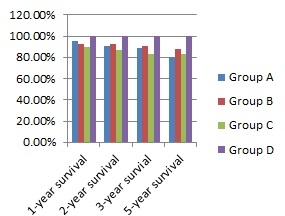Evaluation of Long Term Outcome After Living Donor Liver Transplantation in Sequential 653 Recipients with or without Viral Infection: Is HBV & HCV Co-Infection Better Than the Monoinfection? A Single Center Retrospective Analysis.
H. Yang, A. Thorat, L. Jeng, C.-C. Yeh, T.-H. Chen, S.-C. Hsu, K.-S. Poon.
Organ Transplantation, China Medical University Hospital, Taichung, Taiwan.
Meeting: 2016 American Transplant Congress
Abstract number: D287
Keywords: Hepatitis B, Hepatitis C, Living-related liver donors
Session Information
Session Name: Poster Session D: Viral Hepatitis
Session Type: Poster Session
Date: Tuesday, June 14, 2016
Session Time: 6:00pm-7:00pm
 Presentation Time: 6:00pm-7:00pm
Presentation Time: 6:00pm-7:00pm
Location: Halls C&D
Background:
End-stage liver disease secondary to HBV and HCV coinfection is not uncommon in Asia.However,long term outcome of such patients after living donor liver transplantation (LDLT) is scarcely discussed.Although few studies described increased rates of liver allograft loss, recent studies have, on contrary, reported a better outcome of HBV/HCV recipients after LT as compared to monoinfected patients.In this study,we compared the outcomes of patients with HBV & HCV co-infection after LDLT.
Methods:
This is retrospective analysis of 653 recipients that underwent adult to adult LDLT at our institute from Sept 2002 to Aug 2015.All the patients were categorized in four groups:Group A:Patients without any viral infections (n=160),Group B:Patients infected with HBV (n=283),Group C:Patients infected with HCV (n=187),Group D:Patients co-infected with HBV & HCV (n=23).
Results:
The mean age of the recipients was 53.70 years (M:F,473:180). 24.5%(n=160)recipients were devoid of any viral infection whereas HBV & HCV disease was present in 43.33% (n=283) & 28.63%(n=187)of the recipients,respectively.HBV & HCV co-infection was present in 3.52% (n=23)recipients. 5-year survival for group A, B, C, and D recipients were 70.69%, 75.97%, 71.85%, and 76.26% respectively. For HCC subgroup, the 5-year survival was more for HBV group (65.27%) than the co-infection group(56.97%). However, for non-HCC cohort, 5-year survival was 100% for the co-infection group as compared to Group A(79.85%), group B(87.49%), and group C (82.72%) (Figure1).
Conclusions:The complex viral interactions in patients with HBV-HCV coinfection tends to cause only mild, slow growing disease process than expected. In absence of malignancy, the HBV-HCV co-infection has resulted better 5-year survival as compared to the monoinfected patients. This result definitely favors improved outcome after LDLT for recipients with coexisting HBV-HCV infection which is contrary to previous reports of reduced graft survival in such patients. 
CITATION INFORMATION: Yang H, Thorat A, Jeng L, Yeh C.-C, Chen T.-H, Hsu S.-C, Poon K.-S. Evaluation of Long Term Outcome After Living Donor Liver Transplantation in Sequential 653 Recipients with or without Viral Infection: Is HBV & HCV Co-Infection Better Than the Monoinfection? A Single Center Retrospective Analysis. Am J Transplant. 2016;16 (suppl 3).
To cite this abstract in AMA style:
Yang H, Thorat A, Jeng L, Yeh C-C, Chen T-H, Hsu S-C, Poon K-S. Evaluation of Long Term Outcome After Living Donor Liver Transplantation in Sequential 653 Recipients with or without Viral Infection: Is HBV & HCV Co-Infection Better Than the Monoinfection? A Single Center Retrospective Analysis. [abstract]. Am J Transplant. 2016; 16 (suppl 3). https://atcmeetingabstracts.com/abstract/evaluation-of-long-term-outcome-after-living-donor-liver-transplantation-in-sequential-653-recipients-with-or-without-viral-infection-is-hbv-hcv-co-infection-better-than-the-monoinfection-a-si/. Accessed March 2, 2026.« Back to 2016 American Transplant Congress
